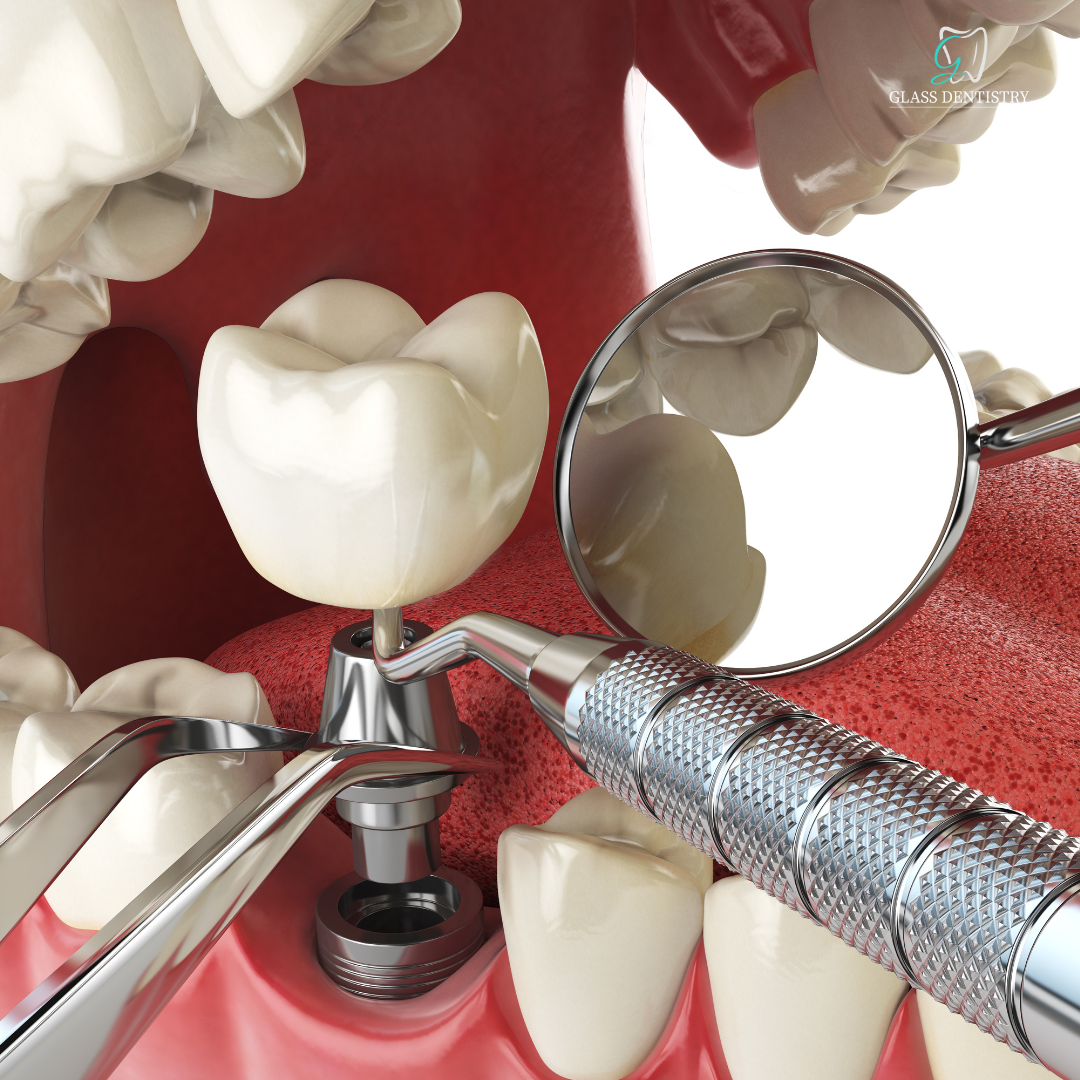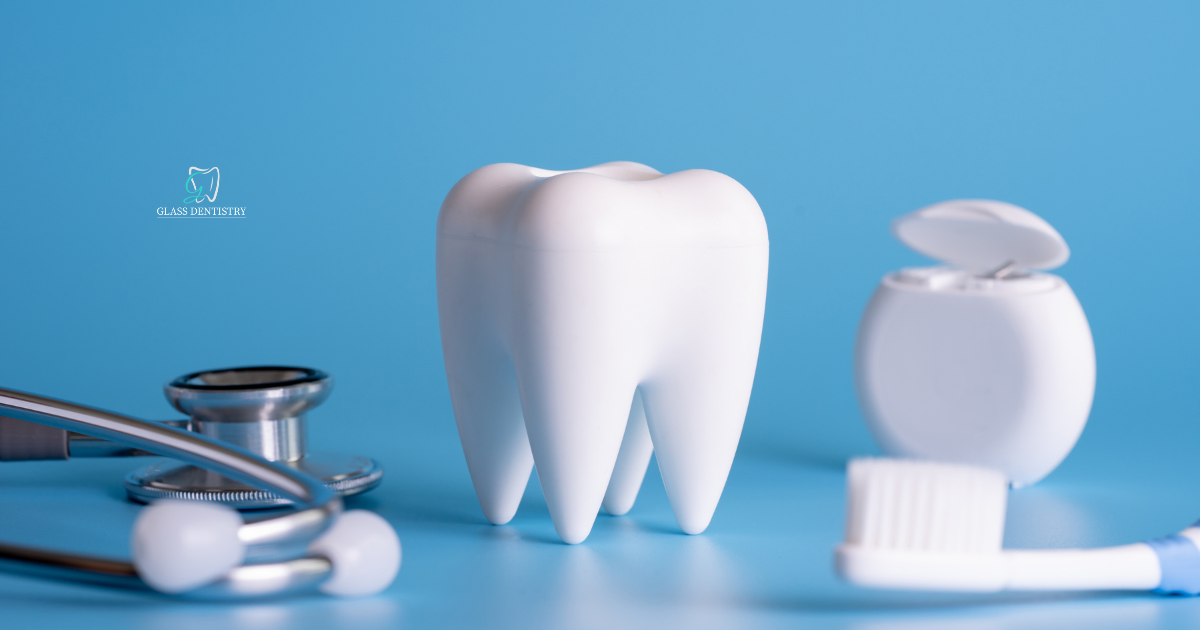Finding the Best Dental Care in Clanton
February 11, 2025
Expert Tips to Help You Choose the Right Dentist for Your Smile
Written by Glass Dentistry
- Follow us: Facebook
and Instagram
When it comes to maintaining your oral health, finding the right dental care provider is essential. At Glass Dentistry, we strive to be the best dentist in Clanton by offering comprehensive and compassionate dental services for patients of all ages. Whether you're searching for a reliable dental office in Clanton or need specialized care, we’ve got you covered.
Why Glass Dentistry is the Best Choice in Clanton
At Glass Dentistry, we are dedicated to providing top-notch dental care tailored to your needs. Our team of experienced professionals ensures that every visit is comfortable and effective. Here’s why we stand out:
- Comprehensive Care: From routine check-ups to advanced treatments, we offer a full range of services to meet all your dental needs.
- State-of-the-Art Technology: We use the latest technology and techniques to deliver precise and efficient care.
- Patient-Centered Approach: Your comfort and satisfaction are our top priorities. We take the time to listen to your concerns and address them with personalized care.
Your Local Dental Office in Clanton
Conveniently located in Clanton, our dental office is designed to be a welcoming and accessible place for all your dental needs. We understand the importance of finding a local dental provider who you can trust for routine visits and urgent care.
Affordable Dental Implants in Clanton
If you’re considering dental implants, or any restoration Glass Dentistry offers affordable solutions without compromising on quality. Implants are designed to restore your smile and functionality with durable and natural-looking results. We work with highly trained oral surgeons who specialize in implant surgeries.
At Glass Dentistry, we are committed to delivering exceptional dental care and ensuring that every patient feels valued and well-cared for. Whether you need a routine check-up or specialized treatment, we are here to help. Visit us in Clanton and experience the difference of top-tier dental care that Glass Dentistry has to offer. www.glassdentistry.com
Ready to Transform Your Smile?
At Glass Dentistry, we offer expert cosmetic dental services to help you achieve the smile you've always dreamed of. Whether you’re interested in teeth whitening, clear alignment, porcelain veneers, or dental implants, our team is here to guide you every step of the way. Follow us: Facebook
and Instagram. Contact us today to schedule your consultation and learn more about how our cosmetic dentistry services can enhance your smile. Visit Glass Dentistry or call us at 205-755-1111
to get started!

Written by Glass Dentistry - Follow us: Facebook and Instagram Everyone wants a whiter, brighter smile, but how often should you actually whiten your teeth? It’s a great question and one that deserves a real, simple answer. Whitening your teeth too often can cause problems like sensitivity or enamel damage. Whiten too little, and you might not get the results you want. Let’s break it down so you know exactly what to do (and not do) for a healthy, glowing smile! How Often Is It Safe to Whiten Your Teeth? When using at-home whitening kits, like whitening strips or trays, it’s best to limit use to every 6 months or as directed by your dentist . 🔗 Read more from the American Dental Association (ADA) on safe whitening practices. Here’s a quick cheat sheet: At-Home Whitening Kits: Every 6 months or when you notice stains returning Whitening Toothpaste: Daily use is fine, but it won’t dramatically whiten deep stains Touch-Ups with Trays: Light maintenance touch-ups can be done every few months (with dentist-approved products) Factors That Affect How Often You Should Whiten Every smile is different! Here are some things that could change how often you need whitening: Diet: Drinking coffee, tea, red wine, or soda can cause more staining. Smoking: Tobacco use can darken teeth much faster. Natural Tooth Color: Some people naturally have slightly darker enamel. Oral Hygiene Habits: Brushing, flossing, and regular dental cleanings help keep stains away longer. Sensitivity Issues: If you experience tooth sensitivity, you’ll want to space out treatments even more. 🔗 Learn more from Colgate about how lifestyle affects whitening. Signs You’re Whitening Too Much Over-whitening can actually harm your teeth! Look out for: Increased tooth sensitivity Gum irritation Chalky or uneven enamel appearance Lingering tooth discomfort If you notice any of these issues, it’s important to stop whitening and check with your dentist before continuing. How to Keep Your Smile Bright Between Treatments Want to extend your whitening results? Here’s how: Brush with a whitening toothpaste (ADA-approved) Drink staining beverages through a straw to avoid contact with your teeth Rinse or brush your teeth after eating dark-colored foods Visit your dentist for regular professional cleanings 🔗 Check out TeethTalkGirl’s full guide on caring for your teeth after whitening. Conclusion: Keep It Simple, Keep It Safe Whitening your teeth is a great confidence booster, but like anything else, it’s all about balance. Stick with once or twice a year for professional treatments, and use at-home products carefully. Always listen to your teeth — and your dentist! 📍 Have questions about whitening your teeth safely? Contact us today to schedule your consultation and learn more about how teeth whitening services can enhance your smile. Visit Glass Dentistry or call us at 205-755-1111 to get started! Please visit Glass Dentistry or Follow us: Facebook and Instagram

Written by Glass Dentistry - Follow us: Facebook and Instagram If you’ve ever looked in the mirror and wished for a brighter smile, you’re not alone. Teeth whitening is one of the most popular cosmetic dental treatments out there. But if you’ve ever wondered, “Will teeth whitening damage my teeth?”, you’re asking a very smart question. Let’s break down what you need to know about teeth whitening, the safe way. Dentist-Administered Whitening vs. Over-the-counter Kits There are two common ways people whiten their teeth: Dentist-Administered whitening treatments and over-the-counter (OTC) whitening kits. Both can work, but they come with different risks and results. Dentist-Administered whitening Done under Dentist supervision Stronger but controlled whitening agents Results are usually quicker and more even Reduced risk of damage or overuse Over-the-counter Whiteni ng Kits Include strips, gels, and trays sold in stores May be too strong or too weak depending on your teeth Misuse can lead to tooth sensitivity and gum irritation Hard to monitor how long to use without expert guidance According to the Cleveland Clinic , teeth whitening is generally safe when done correctly — but overusing products or using ones not made for your teeth can cause long-term problems. So, Will Teeth Whitening Damage My Teeth? Here’s the truth: not if it’s done safely . But if you use whitening products incorrectly or too often, it can lead to: Tooth sensitivity (especially to hot/cold foods) Enamel damage over time Gum irritation or burns from contact with whitening gel Sensodyne also notes that many OTC kits can erode enamel when misused — and once enamel is gone, it doesn’t grow back. How to Whiten Safely (And Protect Your Smile) If you’re thinking about whitening, here are smart steps to keep it safe : ✅ Talk to your dentist first — especially if you have crowns, fillings, or sensitive teeth ✅ Use dentist-approved products ✅ Don’t whiten more than recommended (usually every 6–12 months) ✅ Avoid highly acidic or abrasive products ✅ Use a fluoride toothpaste to protect your enamel Conclusion Teeth whitening can be great for your confidence or self-esteem, but it’s only safe when done the right way. Always get your dentist’s advice before trying a new whitening treatment. Your smile is worth it. 📍 Have questions about whitening your teeth safely? Contact us today to schedule your consultation and learn more about how teeth whitening services can enhance your smile. Visit Glass Dentistry or call us at 205-755-1111 to get started! Please visit Glass Dentistry or Follow us: Facebook and Instagram

Oral cancer affects thousands every year—but early detection can save lives. In this blog, we break down the risks, warning signs, and how your regular dental visits can play a life-saving role. Learn how quick, painless screenings during your checkup can help catch oral cancer early. Don’t wait! Read on to protect your smile and your health.

Written by Glass Dentistry - Follow us: Facebook and Instagram Why Some Dental Implants Fail and How to Ensure Long-Term Success Dental implants have revolutionized modern dentistry, offering a long-lasting, natural-looking solution for missing teeth. With a success rate of nearly 95%, they are one of the best tooth replacement options available. However, dental implant failure can still occur, causing frustration and additional costs for patients. Understanding the causes of dental implant failure, recognizing the warning signs, and knowing how to prevent complications can help ensure your implants last a lifetime. 5 Common Causes of Dental Implant Failure While dental implants are designed for durability, certain factors can lead to failure. Let’s explore some of the most common causes: 1 . Peri-Implantitis (Infection Around the Implant) One of the leading causes of implant failure is peri-implantitis, an infection that affects the gum and bone surrounding the implant. According to Healthline , this condition occurs when bacteria build up due to poor oral hygiene, smoking, or untreated gum disease. If not caught early, peri-implantitis can cause bone loss, making the implant loose and eventually leading to failure. 2. Insufficient Bone Density Successful implants rely on a process called osseointegration, where the implant fuses with the jawbone. If a patient lacks enough bone to support the implant, the risk of failure increases significantly. According to Atlanta Periodontics , factors like osteoporosis, bone resorption, or previous tooth extractions can weaken the jawbone, preventing the implant from properly integrating. In such cases, bone grafting may be necessary before implant placement. 3. Poor Placement or Surgical Errors Choosing an experienced dentist or oral surgeon is crucial to implant success. If an implant is placed at the wrong angle or position, it may not integrate correctly with the bone, leading to instability. Improper placement can also damage nearby nerves or sinuses, causing discomfort and requiring implant removal (Bexley Dental) . 4. Medical Conditions That Affect Healing Certain health conditions can slow down the body’s ability to heal, increasing the risk of implant failure. Patients with diabetes, autoimmune diseases, or those undergoing radiation therapy may experience slower healing times or difficulty with osseointegration. A study by the Cleveland Clinic emphasizes the importance of discussing your medical history with your dentist before proceeding with implants. 5. Smoking and Tobacco Use Smoking is a major contributor to implant failure, as it reduces blood flow to the gums and bone, impairing healing. Research suggests that smokers are twice as likely to experience implant failure compared to non-smokers. If you’re considering dental implants, quitting smoking can significantly improve your success rate (Healthline). 4 ways to Prevent Dental Implant Failure While implant failure is concerning, taking the right steps can greatly reduce the risks. Here’s how to ensure your dental implants last for years to come: 1. Choose an Experienced Dentist Not all dentists specialize in implantology, so selecting a qualified and experienced professional is crucial. Look for a provider with advanced training in implant placement and a track record of successful cases. A well-placed implant reduces the risk of failure and ensures proper healing and integration (Atlanta Periodontics). 2. Maintain Excellent Oral Hygiene Brushing, flossing, and using an antibacterial mouthwash are essential for preventing peri-implantitis. Regular dental cleanings help remove plaque and bacteria, reducing the risk of infection. According to Bexley Dental, patients who maintain good oral hygiene are far less likely to experience implant complications. 3. Follow Post-Surgical Instructions Carefully After getting an implant, following your dentist’s post-op care instructions is key to preventing failure. This includes avoiding hard or sticky foods, taking prescribed antibiotics, and attending follow-up visits to ensure proper healing. Ignoring these steps can lead to complications like excessive swelling, infection, or poor integration. 4. Stop Smoking and Manage Health Conditions If you smoke, quitting before and after implant surgery significantly increases success rates. Additionally, managing medical conditions like diabetes by maintaining stable blood sugar levels can improve healing and reduce complications. The Cleveland Clinic emphasizes the importance of discussing health concerns with your dentist before implant placement. Signs That Your Dental Implant Might Be Failing Recognizing early signs of implant failure can prevent further damage and help you seek treatment sooner. Here are some warning signs: ✅ Persistent Pain or Swelling – Some discomfort is normal after surgery, but if pain persists for weeks, it could signal an issue. ✅ Loose or Wobbly Implant – A properly integrated implant should feel just like a natural tooth. If it moves, there may be bone loss or improper healing. ✅ Bleeding or Pus Around the Implant – Signs of infection should be addressed immediately to prevent peri-implantitis from worsening. ✅ Difficulty Chewing – If your implant feels uncomfortable when eating, it may need adjustment or additional support. If you notice any of these symptoms, schedule an appointment with your dentist as soon as possible to assess the implant and prevent further complications (Healthline) . What to Do If Your Implant Fails If your implant is failing, don’t panic—there are ways to fix the problem. Your dentist may recommend: 🔹 Bone grafting – To rebuild lost jawbone before placing a new implant. 🔹 Antibiotics and deep cleaning – To treat infections like peri-implantitis. 🔹 Implant removal and replacement – If the implant cannot be saved, it may need to be replaced with a new one after healing. With the right treatment plan, a failed implant can often be corrected, allowing you to regain your beautiful, fully functional smile. Ensuring Your Dental Implants Last a Lifetime Coclusion: Dental implants are one of the best ways to restore missing teeth, but they require proper care and expert placement to succeed. By choosing an experienced dentist, maintaining excellent oral hygiene, and following post-surgical care, you can enjoy the benefits of strong, long-lasting implants. Would you consider dental implants to restore missing teeth, or do you have concerns about the procedure? If you’re experiencing issues with your dental implant, don’t wait—schedule a consultation with a Glass Dentistry to address the problem early. With the right care, your implants can last a lifetime! Follow us: Facebook and Instagram . Contact us today to schedule your consultation and learn more about how our cosmetic dentistry services can enhance your smile. Visit Glass Dentistry or call us at 205-755-1111 to get started! #DentalImplants #ImplantFailure #OralHealth #StrongSmile #HealthyTeeth #LongLastingImplants

Written by Glass Dentistry - Follow us: Facebook and Instagram If you're considering dental implants , you might be wondering: Will dental insurance cover implants ? The answer isn’t always straightforward, as coverage varies depending on your insurance provider and specific plan. In this blog, we’ll break down how dental insurance applies to implants, what costs you might be responsible for, and how to maximize your benefits. Understanding Dental Implants and Their Costs A dental implant is a permanent solution for missing teeth, consisting of a titanium post surgically placed in the jawbone, an abutment, and a custom-made crown. Unlike dentures or bridges, implants provide a natural look and long-term durability. However, they can be costly, with prices ranging from $3,000 to $5,000 per tooth on average. Many people assume that their dental insurance covers implants, but unfortunately, that’s not always the case. While some policies provide partial coverage, others consider implants a cosmetic procedure and do not cover them at all. Does Dental Insurance Cover Implants? The level of coverage depends on several factors, including your plan type, insurance provider, and whether the procedure is deemed medically necessary. Here’s a general breakdown: 1. Full or Partial Coverage Some dental insurance plans cover a portion of the implant procedure , such as consultations , X-rays , anesthesia , and crowns . Others may provide 50% coverage, but only if the implant is necessary due to an accident or medical condition. Many standard dental insurance plans do not cover implants at all, considering them elective or cosmetic. 2. Annual Maximums and Waiting Periods Dental insurance plans usually have annual maximums (typically between $1,000 - $2,500 ), which means your benefits may only cover a small part of the total cost. Some plans require a waiting period (6-12 months) before covering major procedures like implants. 3. Alternative Coverage Options If your dental plan does not cover implants, there are other options, such as: Discount Dental Plans: Membership-based plans can offer reduced costs on implant procedures. Flexible Spending Accounts (FSA) or Health Savings Accounts (HSA): These allow you to use pre-tax dollars to pay for dental work, reducing overall costs. How to Find Dental Insurance That Covers Implants If you’re shopping for a dental insurance plan, here’s how to find one that covers implants: 1. Look for Major Restorative Coverage Policies that cover major restorative procedures (such as bridges and dentures) are more likely to include implants. Look for wording like “implant coverage” in the benefits section. 2. Compare Insurance Providers Some providers may offer implant benefits while others do not. 3. Ask About Pre-Authorization Before scheduling an implant procedure, ask your insurance provider if they require pre-authorization. This can prevent unexpected costs and clarify what portion of the procedure is covered. Breaking Down Implant Coverage: What’s Included? Even if your insurance doesn’t fully cover implants, they may still cover parts of the procedure: 1. Initial Consultation & X-Rays Most insurance plans cover diagnostic procedures , including consultations and X-rays , which are essential in planning for implants. 2. Tooth Extraction If an implant is replacing a damaged or decayed tooth, insurance may cover the tooth extraction as a necessary procedure. 3. Bone Grafting Some patients require a bone graft to strengthen the jawbone before implant placement. Insurance may cover this if it is medically necessary. 4. Crown Even if the implant post isn’t covered, insurance may cover the crown, which is essential to completing the restoration. How to Reduce the Cost of Dental Implants If your insurance offers limited or no coverage, consider these cost-saving options: 1. Use an HSA or FSA A Health Savings Account (HSA) or Flexible Spending Account (FSA) allows you to use pre-tax dollars to cover dental expenses, reducing your overall out-of-pocket costs. 2. Look for Dental Discount Plans Some dental discount programs offer 15-50% off implant procedures at participating dentists.. 3. Payment Plans & Financing Many dental offices offer payment plans or financing options like CareCredit to help patients afford implants with manageable monthly payments. 4. Consider Dental Schools Dental schools often offer implant procedures at a reduced cost, as licensed dental students perform procedures under expert supervision. Final Thoughts: Are Dental Implants Worth I t ? Despite the high upfront cost, dental implants are a long-term investment in your oral health. They provide superior durability, prevent bone loss, and improve both functionality and aesthetics. If your dental insurance doesn’t fully cover implants, exploring alternative coverage options, financing, and discount plans can make the procedure more affordable. Before proceeding with treatment, always check your insurance policy and discuss payment options with your dentist. By planning ahead, you can maximize your benefits and find the best way to afford dental implants without breaking the bank. Follow us: Facebook and Instagram . Contact us today to schedule your consultation and learn more about how our cosmetic dentistry services can enhance your smile. Visit Glass Dentistry or call us at 205-755-1111 to get started!

Written by Glass Dentistry - Follow us: Facebook and Instagram Maintaining a healthy smile often requires various dental treatments to address specific needs. Whether you're dealing with a cavity that requires a root canal, a broken tooth that needs a crown, or orthodontic care for your child, understanding these procedures can help you make informed decisions. This blog will cover essential dental treatments, including root canal therapy, dental crowns, orthodontics for children, dental braces, and tooth extractions, providing insights into their benefits and what to expect. 1. Root Canal Treatment: Saving Your Natural Tooth Root canal treatment or endodontic treatment, tooth infection, dental pulp therapy, or tooth preservation, is a common dental procedure designed to save a tooth that has become infected or severely decayed. During the procedure, the dentist removes the infected pulp from the tooth, cleans and disinfects the root canals, and then seals them to prevent further infection. Root canals are often misunderstood as being painful, but with modern techniques, they are no more uncomfortable than getting a filling. The AAE states that root canal treatment can relieve pain and restore your tooth's function, avoiding the need for extraction. 2. Dental Crowns (tooth cap, dental restoration, porcelain crown, tooth protection, crown placement): Protect and Restore Your Teeth Dental crowns are used to protect and restore teeth that are damaged, decayed, or weakened. A crown, often made from porcelain or ceramic, covers the entire visible portion of the tooth, providing strength and improving its appearance. Crowns are also used to cap a tooth after root canal treatment or to cover a dental implant. The ADA notes that dental crowns are a durable and aesthetically pleasing option for restoring a damaged tooth. 3. Orthodontist for Kids: Early Intervention for a Healthy Smile Orthodontic care for children or pediatric orthodontics,is essential for identifying and correcting bite issues early on. An orthodontist can assess your child’s teeth and jaw development, recommending treatments such as dental braces if necessary. Early intervention can prevent more serious dental problems later in life, such as overcrowding or misalignment. The American Association of Orthodontists (AAO) suggests that children should have their first orthodontic evaluation by age 7 to ensure optimal outcomes. 4. Dental Braces: Straighten Your Smile Dental braces are a tried-and-true method for correcting misaligned teeth and improving oral health. Braces apply continuous pressure to gently shift teeth into the desired position over time. There are several types of braces available, including traditional metal braces, ceramic braces, and lingual braces. Each option has its own set of benefits, and your orthodontist can help determine the best choice for you or your child. The ADA emphasizes that braces not only improve the appearance of your smile but also enhance oral health by making it easier to clean your teeth. 5. Tooth Extraction (tooth removal, or tooth pulling): When It's Necessary Tooth extraction is sometimes necessary when a tooth is too damaged to be repaired, such as in cases of severe decay, infection, or trauma. Extractions are also performed to remove wisdom teeth or to make space for orthodontic treatment. While the idea of having a tooth pulled can be daunting, modern dental techniques ensure that the procedure is as painless and comfortable as possible. The Mayo Clinic highlights the importance of following post-extraction care instructions to promote healing and prevent complications. Understanding these essential dental treatments—root canal therapy, dental crowns, orthodontic care for children, dental braces, and tooth extractions—can help you and your family maintain optimal oral health. Whether you're saving a tooth with a root canal, restoring it with a crown, or ensuring your child has a healthy bite with braces, each treatment plays a crucial role in preserving and enhancing your smile. Consult with your dentist or orthodontist to discuss your specific needs and ensure you receive the best care possible. Ready to Transform Your Smile? Are you looking for one of these? Please visit Glass Dentistry or Follow us: Facebook and Instagram Contact us today to schedule your consultation and learn more about how our cosmetic dentistry services can enhance your smile. Visit Glass Dentistry or call us at 205-755-1111 to get started!

Written by Glass Dentistry - Follow us: Facebook and Instagram Maintaining optimal oral health is crucial for overall well-being, and preventive care plays a significant role in achieving this. At Glass Dentistry, we emphasize the importance of preventive dental care to help our patients avoid common dental issues and ensure long-lasting oral health. In this blog, we’ll discuss essential aspects of preventive care, including dental cleanings, oral hygiene tips, gum disease treatment, and fluoride treatments. 1. Dental Cleaning : A Cornerstone of Preventive Care Regular dental cleanings are fundamental to preventing tooth decay and gum disease. During a dental cleaning, our hygienists remove plaque and tartar buildup from your teeth, which can cause cavities and gum issues if left untreated. We recommend scheduling a dental cleaning every six months to maintain your oral health. American Dental Association on Dental Cleanings 2. Essential Oral Hygiene Tips Good oral hygiene at home complements professional dental care. Here are some key tips to keep your smile healthy: Brush Twice a Day: Use fluoride toothpaste and a soft-bristled brush to clean your teeth for two minutes each time. Floss Daily: Flossing removes food particles and plaque from between your teeth and under the gumline. Use Mouthwash: An antibacterial mouthwash can help reduce plaque and freshen your breath. Mayo Clinic’s Oral Hygiene Tips 3. Effective Gum Disease Treatment Gum disease, or periodontal disease, is a common condition that can lead to tooth loss if not addressed. Symptoms include swollen gums, bleeding, and persistent bad breath. At Glass Dentistry, we offer comprehensive gum disease treatments, which may include scaling and root planing to remove tartar below the gumline, and advanced therapies for more severe cases. National Institute of Dental and Craniofacial Research on Gum Disease 4. Fluoride Treatment: Strengthening Your Teeth Fluoride treatments help strengthen tooth enamel and prevent cavities. Fluoride, a natural mineral, can reverse early signs of tooth decay and protect against new cavities. We offer professional fluoride treatments during your routine cleanings or as needed based on your risk factors. Centers for Disease Control and Prevention on Fluoride Preventive dental care is essential for maintaining a healthy smile and preventing more serious dental issues. At Glass Dentistry, we are committed to providing top-notch preventive care services to ensure your oral health remains in excellent condition. Schedule an appointment with us today to get started on your path to optimal oral health. At Glass Dentistry, we offer expert cosmetic dental services to help you achieve the smile you've always dreamed of. Whether you’re interested in teeth whitening, Invisalign, porcelain veneers, or dental implants, our team is here to guide you every step of the way Ready to Transform Your Smile? Are you looking for one of these? Please visit Glass Dentistry or Follow us: Facebook and Instagram Contact us today to schedule your consultation and learn more about how our cosmetic dentistry services can enhance your smile. Visit Glass Dentistry or call us at 205-755-1111 to get started!




Share On: